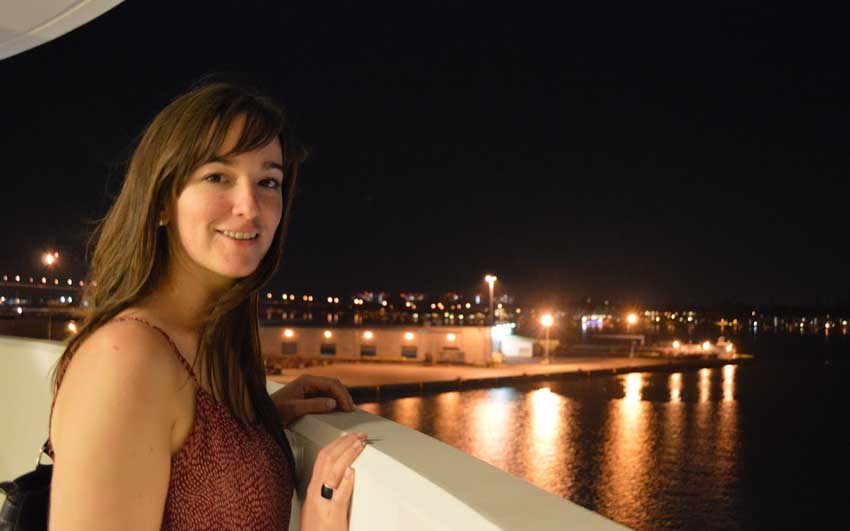Joseba Etxarri. For those who don’t know any different, she is just another girl in Navarre. Her name and last name don’t stand out, and she speaks like everyone else, without a special accent, in both Basque and Spanish. She studied Advertising and Public Relations at the University of Navarre (UNAV) and has worked there for the last three years in the School of Economics and Business, in the area of student exchange. It is then, when speaking English that the evidence of her fluency of the language when you grasp that her background is richer than you might first have first though. Her father is from Erratzu and immigrated to California, while her mother is the Californian daughter of immigrants from Nafarroa Beherea. Christina Irigoyen Etcheverry was born in Yuba City, in the Golden State. As many Basques in the Diaspora her heart is split by geography and feelings on two continents.
I won’t ask you if you feel more American than Basque or vice versa…
-It would be in vain because I feel both. If you took one or the other from me, I wouldn’t be me. Euskera is my language, and the first that I learned at home. I feel the Basque culture strongly inside of me; and the same happens with English and the American culture. But for sure, there are some times when I feel very American here and others, in the US, when I feel very Basque and very European.
You lived in California until the age of 14, living an American life with a Basque accent.
-On a ranch with my parents and my brother Patxi, or Franxisko, as we call him at home. Today there is a Basque club in this area, Iparreko Ibarra, but when we lived there they hadn't started yet. Nevertheless, Basque families in the area used to get together a lot. I remember going to the outdoor activities that we used to attend, and for example an annual gathering and txorizo contests that last year celebrated its 40th a nniversary. We enjoyed that life. When I was eight, I started dancing at the San Francisco Basque club, but had to quit after a year because it was too far to go for practice every week. At home, we always spoke Basque and I learned English when I started school at the age of 6. I would also learn some Spanish at school, so that when we returned to Erratzu, when I was 14, I had a pretty basic vocabulary. We came in the summer of 2001, and at first, especially the first year, it was really hard because I didn’t speak Spanish.
Do you still have friends in California? It is clear that you haven’t lost your English: Today you even use it in a every day basis at work.
-I still have some, and keep in touch with them. A couple of years ago I went to the wedding of a good friend in San Francisco, and this year I had another, but could not attend because of work reasons. Sometimes it’s not easy, but we work hard on both ends to keep in touch. When they come to Erratzu, they count on my house as their own, and vice-versa. In regards to English, I speak English with my mom, or sometimes we start conversations in English and then switch to Basque and to Spanish…mixing and changing languages without even realizing it. I usually watch TV in English and I also read in English and use it at work, so it keeps me in pretty good shape.
Do you go back to the US often?
-I have gone back four times since we moved to Erratzu. I still have family and many friends there, so it’s nice to go back and have a chance to get together, talk and renew our relationships. Part of my people and my geography are there. Sometimes you go and it seems like no time has passed at all, and we pick up right where we left off.
Next week you travel to Colorado for work, to Denver. But before that, we saw you at the presentation of the book Aita deitzen zen gizona (A Man Called Aita), written by Basque-American, Joan Errea.
-I’m going to Denver for work, to a Conference. There are Basques there and a Basque club, but I don’t think I’ll have a chance to visit them. But the book that you are talking about was written by my aunt Joan. She was born, like my mom, in the US and lives there in Nevada, and she wrote that book in Basque and in verse dedicated to her dad. Pello Salaburu found about the story, read it and was very impacted by it. He wrote the prologue for it and was published in Pamiela by Pamiela. I am very aware that a part of our history took place in America, and I think that it is wonderful that it has been gathered and published. Thanks to my Aunt’s work, as far as that part of my family is concerned, it has been preserved and now it is available, not only in petit comité for us, but for the general public.






 Send to a friend
Send to a friend Add comment
Add comment








